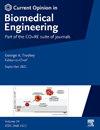AI models for protein design are driving antibody engineering
IF 4.7
3区 工程技术
Q2 ENGINEERING, BIOMEDICAL
引用次数: 4
Abstract
Therapeutic antibody engineering seeks to identify antibody sequences with specific binding to a target and optimized drug-like properties. When guided by deep learning, antibody generation methods can draw on prior knowledge and experimental efforts to improve this process. By leveraging the increasing quantity and quality of predicted structures of antibodies and target antigens, powerful structure-based generative models are emerging. In this review, we tie the advancements in deep learning-based protein structure prediction and design to the study of antibody therapeutics.
用于蛋白质设计的人工智能模型正在推动抗体工程
治疗性抗体工程旨在鉴定具有特异性结合靶标和优化药物样特性的抗体序列。在深度学习的指导下,抗体生成方法可以利用先验知识和实验成果来改进这一过程。随着抗体和靶抗原预测结构的数量和质量的不断提高,基于结构的强大生成模型正在出现。在这篇综述中,我们将基于深度学习的蛋白质结构预测和设计的进展与抗体治疗的研究联系起来。
本文章由计算机程序翻译,如有差异,请以英文原文为准。
求助全文
约1分钟内获得全文
求助全文
来源期刊

Current Opinion in Biomedical Engineering
Medicine-Medicine (miscellaneous)
CiteScore
8.60
自引率
2.60%
发文量
59
 求助内容:
求助内容: 应助结果提醒方式:
应助结果提醒方式:


